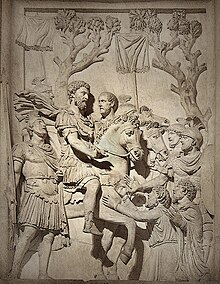Claudius Pompeianus
| Tiberius Claudius Pompeianus | |
|---|---|

Marble relief of Tiberius Claudius Pompeianus (center right) with Emperor Marcus Aurelius in the Capitoline Museums in Rome
|
|
| Consul of the Roman Empire | |
|
In office 173–173 Serving with Gnaeus Claudius Severus |
|
| Preceded by | Sextus Calpurnius Scipio Orfitus and Sextus Quintilius Maximus |
| Succeeded by | Lucius Aurelius Gallus and Quintus Volusius Flaccus Cornelianus |
| Military Governor of Pannonia Inferior | |
|
In office 164–168 |
|
| Suffect Consul of the Roman Empire | |
|
In office 162–162 Serving with Tiberius Claudius Paullinus |
|
| Preceded by | Junius Rusticus and Lucius Titius Plautius Aquilinus |
| Succeeded by | Marcus Pontius Laelianus and Aulus Junius Pastor Lucius Caesennius Sospes |
| Personal details | |
| Born | 125 Antioch, Syria, Roman Empire |
| Died | 193 (aged 68) Rome, Roman Empire |
| Spouse(s) | Lucilla |
| Children | Lucius Aurellius Commodus Pompeianus |
| Religion | Roman Paganism |
Tiberius Claudius Pompeianus (c. 125 – aft. 193) was a politician and military commander during the Roman Empire. A general under the Emperor Marcus Aurelius, Pompeianus distinguished himself during Rome's Parthian and Marcomannic Wars. A member of the imperial family due to his marriage to Lucilla, a daughter of Marcus Aurelius, he was a key figure during the Emperor's reign. Though offered the imperial throne three times, he refused to claim the title for himself.
A native of Antioch in Syria, Pompeianus was from relatively humble origins. His father, Tiberius Claudius Quintianus, was a member of the Equestrian Order. His family first received their Roman citizenship during the reign of Emperor Claudius. Pompeianus was a new man ("novus homo") as he was the first member of his family to be appointed as a Senator.
Much of Pompeianus' early life has been lost to history. He participated in the Roman–Parthian War of 161–166 under the commander of Emperor Lucius Verus, likely as a Legionary Commander. Sometime prior to the Parthian campaign, he was elevated to the rank of a Senator. He served with distinction during the war, earning him appointment as Suffect Consul for the remainder of the year 162 AD.
Following the completion the Parthian campaign, the Emperor Marcus Aurelius appointed him military governor of Pannonia Inferior on the Empire's northern frontier along the Danube River. He likely served from 164 until 168. In late 166 or early 167, a force of 6,000 Lombards invaded Pannonia. Pompeianus defeated the invasion with relative ease, but it marked the beginning of a larger barbarian invasion.
...
Wikipedia
